The Role of Abai in Kazakh Literary world
Share:
The Kazakh literature, as correctly pointed out in researches of Z. Akhmetov, M. Akhinzhanov, M. Silchenko, K. Bekhozhin, N. Smirnova, H. Saikiyev - poetry prevailed before the revolution itself, and because it is in the poetic art of approved new principles of realism. In poetry, new forms of literature and literary language have been developed, which, of course, is a great driving force for the further development of versification. There was an urgent need for decisive and immediate updating of poetics, and, consequently, to a more diverse and widespread use of a variety of emotional expression.

It is important to note at once that Abay, primarily a poet-thinker, made it infinitely many in the field of lyric poetry, "his talent is revealed wide and varied." In his lyrical reflections on the most important aspects of social life itself appears Abay central figure - angry accuser. His lyrics are multi-tone thematically deployed and multifaceted: poetry on “dangerous” social topics (socio-political, philosophical, moralistic, satirical content), and love poems (mostly - characteristic of female portraits), and landscape poetry, as well as household - poems dedicated to death relatives and friends, and so on. Emotional poems wide field - there and resentment, joy and light and light sadness, and caustic satire.
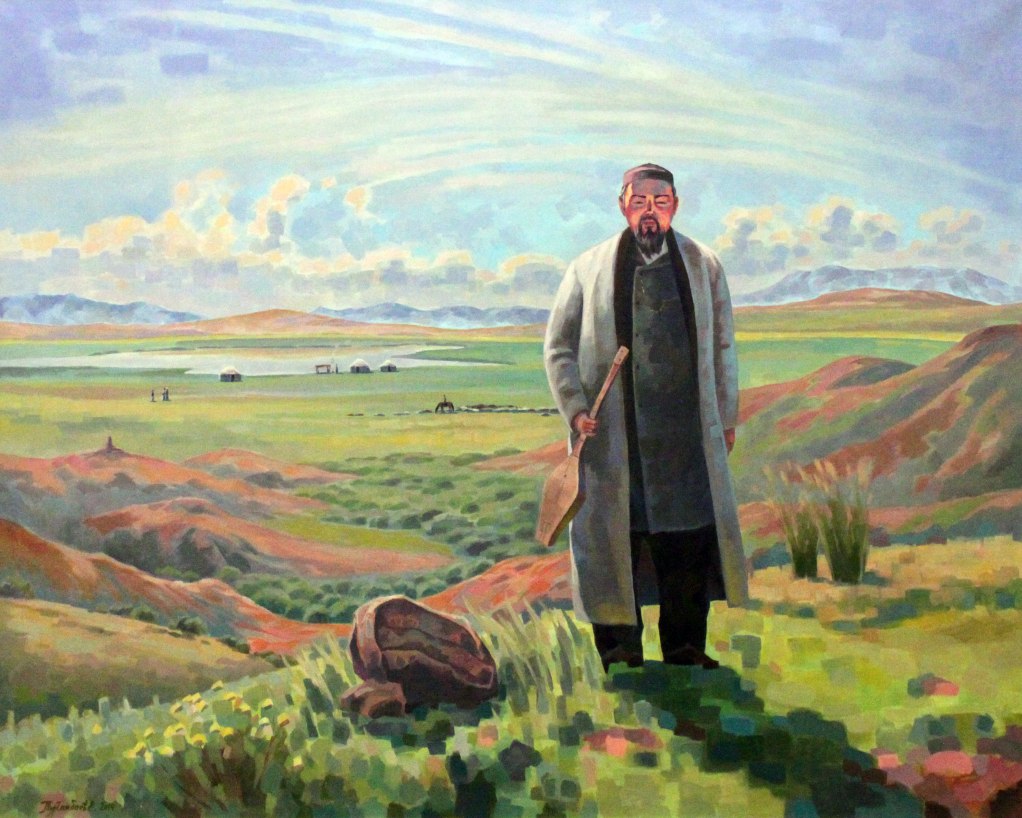
As mentioned earlier, the lyrics of Abay is closely linked with the traditions of Russian realism. Strengthening the realistic method in the Kazakh poetry Abay creatively comprehended and mastered the art principles, developed by Russian writers. Based on the experience of realist poets using it and transforming, Abay blaze new trails in the Kazakh literature, and above all - in the versification.
One of the main merits of Abai is to strengthen them in the Kazakh poetry of individual lyric traditions. He made the defense of the new trends, illustrating its advantages in almost all the main types of lyrical works. It is logical that many of the poet's works are in the nature of confession, some lyrical effusions of the poet to the reader. Like all the lyrics Abai, they differ psychological penetration, the ability to correctly and accurately transmit the human experience.
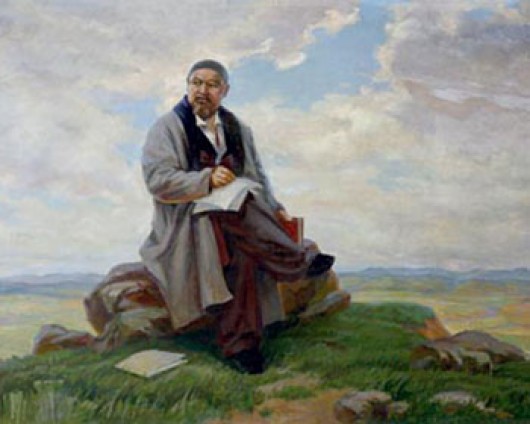
Mukhtar Auezov said: "Great connoisseur of Kazakh folklore, Abay in his work is widely enjoyed all the wealth of the Kazakh language, but he completely rejects the canonical forms of oral folk poetry. He is an innovator in poetry. Abai Kazakh introduces new previously unknown forms of poetry, borrowed from classical Russian literature. "
Abai Kazakh enriched not just poetic language - he showed the ways and means of creative use of the national language resources in poetry. Without this comprehensive effort to transform the poetic language - without expanding the entire arsenal of figurative and poetic means of Kazakh poetry, poetic vocabulary enrichment, making a new poetic style and perfection of the syntactic structure of poetic language - might not be fully implemented is the great work being done by the poet developing and enriching the rhythm and intonation system of poetic speech in Kazakh literature.
Zaki Akhmetov, "Development of poetry, because of the close connection and interdependence of all parties of the art form, was important not only in itself, but also for a more complete use of all other means of poetic language, his expressive, emotional strength and brightness. The issue of enrichment Abai Kazakh poetry with new techniques and tools is therefore not only a question of the external form of the verse. It is at the same time the question of the development of poetry in the broadest sense. For enriching verse, Abay immeasurably extended the best possible reproduction of artistic life in the Kazakh poetic art. "
All work on the Abai verse differed genuine innovation: he developed versification and widely diversified. It generates new forms of verse, he revealed the creative wealth of the most flexible forms of poetry writing poetry. And, in accordance with all the principles of his work made in Abay he created works of simplicity and naturalness required realist poetry. Abay, remembering the words of Pushkin about the need to "bring the poetic style to the noble simplicity," freeing it "from the conventional ornaments Prosody", solved the same problem.
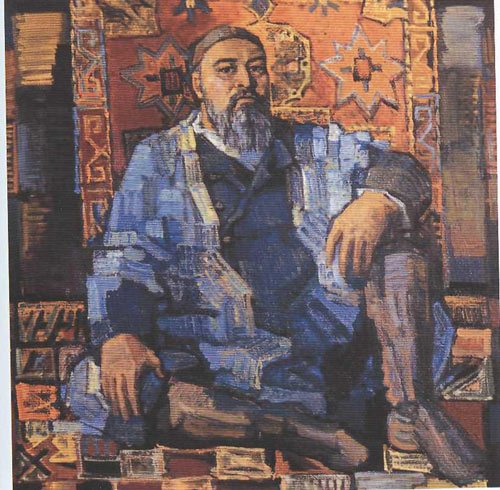
Abay innovatively express their thoughts and ideas, even when using well-known and to his size and form of the verse. His deep insight into the rhythmic structure of the Kazakh poetry, subtle comprehension of its features, allows Abai open all new and new rhythmic and melodic wealth commonly used poetic forms.
For example, many of his works he wrote hendecasyllabic verse, which was one of the usual size of the Kazakh syllabic versification: "It should be noted that Abay used only favorite in the Kazakh folk poetry variant of this size, where each verse has four syllable style ending. Another variant of this size with the end in three syllables became widely used in poetry only in the Soviet era. "
Thanks to the talent of the poet all the expressive features and capabilities this size appeared with extraordinary force, previously unknown. Hendecasyllabic verse becomes at Abai extremely flexible and mobile. To a large extent this was possible because the poet allowed greater freedom in the mutual displacement in a row the first two rhythmic parts that can consist of three syllables and four.
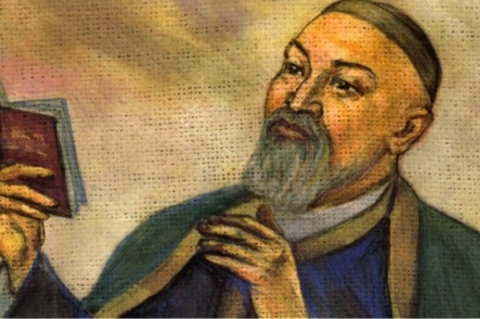
Developing hendecasyllabic verse Abay pays great attention to the combination of lines and rhyming. Particularly interesting combination of four verses in line with the union of the same rhyme first, second and fourth verses. He also creates works that uses the reception mono rhymes, basing it on the deployment of a traditional rhyme in eleven syllable style - aaba. This can be seen in his poems "Qan sonarda bүrkіtshі shyghady angha" ( "The rider with a golden eagle rides in the early snows"), "Qyran burkіt not almaydy, salsa baptap" ( "Though any prey eagle takes") - he uses this method, rhyming poems continue through the line. Zaki Akhmetov believes that "bonding so the same rhyme many lines Abay as it plays the way to rhyme peculiar to such well-known in the oriental poetry verse one rhyme lyric poem, like a gazelle, in which rhyme connecting the first two verses It is repeated in the second verse of each of the following couplet - beat. "
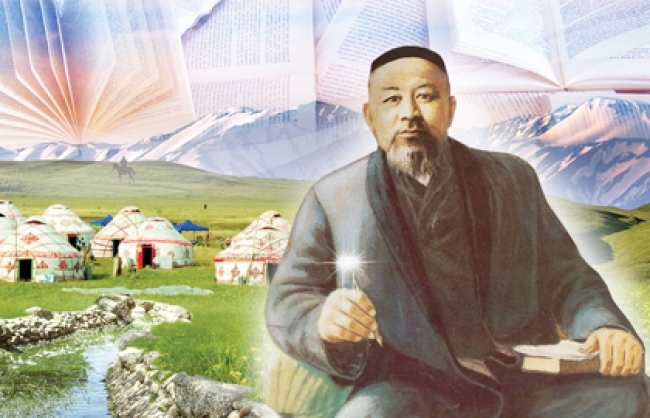
The traditional form zhyrau gets in the works of Abai great artistic power and expressiveness. It belongs to the work of the poet as the size of lyrical works, different in theme and character: "Keldіk Talay zherge endі" ( "Dear long life carrier"), "Bolys Bolden mіneki" ( "Finally parish, I became"), "Zhazdy kun shіlde bolғanda "(" Summer - it's time to sun) and others. Thus, we can say on the approval of Abai in the Kazakh poetry writing poetry zhyrau as a full-fledged literary form.
"Abai reveals mastery zhyrau size and in the poem" Keldіk Talay zherge endі ". The grouping of poems and rhymes sequence performed in this work more closely than is usually the case in zhyre. The main rhyme returns in most cases three, more rarely - two verses. These three or two lines are connected each time a new rhyme. And that is very common in rhyme involving all 58 lines of the poem with the exception of only two verses. Meanwhile zhyre verses that remain outside the rhyme usually occur more frequently. Moreover, cross-cutting rhyme is repeated in the poem Abaya 17 times! "(Zaki Akhmetov).
But eleven syllable style Abay innovation is not confined to: a special significance not only for the development of creativity of Abai, but also for the Kazakh literature, was the development and application poet seven-syllable, seven-octosyllabic and six syllable style forms of verse.
Earlier in the leading genres of folk poetry overwhelmingly dominated zhyr and eleven syllable style. Semi- and octosyllabic, with strophic form of quatrains, used only in small genre forms.. Proverbs, aphorisms, riddles, etc. Abay is the creativity put these forms of verse in a number of the most commonly used in the Kazakh poetry. With insight truly great artist, he guessed what force and rhythmic intonation and syntactic expressiveness inherent in these poetic forms, and creatively opened their rhythmic and melodic richness. In the poems of Abai these forms of verse appear in a perfect artistic and creative expression, in which their rhythmic intonation possibilities are revealed in full force. It is appropriate to note that these dimensions are only received widespread in modern Kazakh poetry. This is certainly the merit of Abai.
In search of a new expression of poetic speech, in the forms of seven-syllable and seven octosyllabic poet originally applied along with the traditional in the Kazakh folk poetry rhyme in a line - "Keshegі Ospan aghasy" ( "Work stranger Ospan valued"), "Bermegen qulgha qaytesіn" ( " not so strong man ")," Zhylaghandy toқtatyp "(" Magish, darling do not cry "), and others - no less characteristic of the Kazakh poetry stanza - stanza rhyme aaba -" Zaman aqyr zhastary "(" Look at the youth "), "Ayttym Salem, qas Kalam" ( "I send, to thineyebrowed a hello").
In addition, in many works, which are used in the form four syllable style verse, he introduces cross rhyme Ababii. For example, in verse "Mensіnbeushі it nadandy" ( "I proudly despised ignorance and darkness"), "Әsempaz bolma әrnege" ( "Be selective in his way"), "Ne іzdeysіn, konіlіm ?" ( "What are you looking , my soul?"). These methods are rhyming he introduces also in six syllable style verse. It is important to note that cross-rhyme to Abai in Kazakh poetry did not have any noticeable and important discovery: "The merit of Abai, first used in short verses cross rhyme, was specially marked I. Dzhansugurov in a special article about the artistic skill of the poet. Also of interest is the use of Abai mezhdustrofnoy rhyme that links not just one but a number of stanzas. Even in the work "Iuzi - raushan, kөzі - gauhar" ( "How to ruby, you sweet eyes"), relating to the number of the first poetic experiments adolescence, in which the young poet recreates the poetic style of oriental poetry classics, we find the rhyme aaab. There used rhyme four syllable style form with the same ending in the first three verses and a single common rhyme for the last line of verses. "
Thus, we can say that innovation of Abai in the above verse is largely manifested itself in a variety of applications poetic shapes and sizes of Kazakh poetry, many of which he subjected to varying degrees of creative processing, enriched with the methods and techniques of their consumption.
References:
1. “Zhizn I tvorchestvo Abaya” sbornik statey – Izdatelstvo AN KazSSR, 1954
- Ø “Zhizn I tvorchestvo Abaya Kunanbayeva” – M. Auezov;
- Ø “Qazaq Adebietinin orkendeu zholyndagy Abaidyn tarihi orny” - G. Musrepov;
- Ø “O filosovskih vzglyadah Abaya Kunanbayeva” – K. Beysembiyev;
- Ø “Abaidyn qoghamdyq-sayasi kozqarastarynyn qalyptasuy” – M. Aqynzhanov;
- Ø “Qazaq realistik adebietinin negizin salushi” – B. Kenzhebayeva;
- Ø “Abaidyn aqyndyq sheberligi turaly” – T. Nurtazin;
- Ø “Put Abaya k realizmu”, “Literaturnaya deyatelnost 80 godov” – M. Silchenko;
- Ø “Abai shygharmalaryndaghy syn” – M. Khassenov;
- Ø “Abai shygharmalarynda bi-bolys, oyaz-bastyqtardyn satirikalyq tipteri” – G. Abetov;
- Ø “Rol Abaya v razvitii kazakhskogo literaturnogo yazyka” – I. Sauranbayev;
- Ø “Perevody kak forma tvorcheskoi svyazi Abaya s russkoy literaturoy” – Z. Akhmetov;
- Ø “Perevody Lermontova Abayem” – N. Polibina;
- Ø “Psikhologicheskie i pedagogicheskie vzglyady Abaya Kunanbayeva” – T. Tazhibayev;
- Ø “Pesni Abaya” - G. Chumbalova;
2. “Tradicii russkogo realisma i kazakhskoi literatury”. - "Druzhba narodov" - M. Auezov, 1949;
3. “Abai Encyklopediya” – Qazaq Encyklopediyasy;
4. “Abai: tyazhest poleta. Iz serii: zhizn zamechatelnyh lyudei” - N. Anastaasyev, 2009;
5. “Abaitanu”. – “Birinshi tom” – M. Myrzaakhmetuly.
Share: